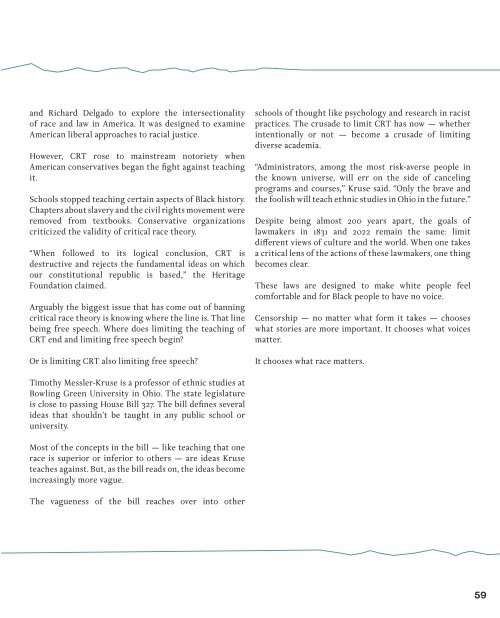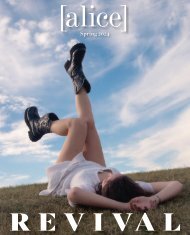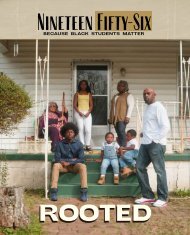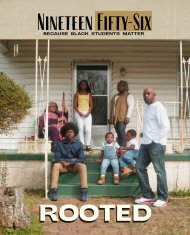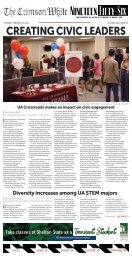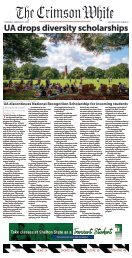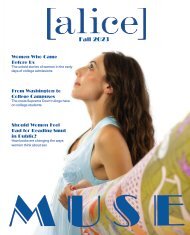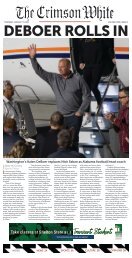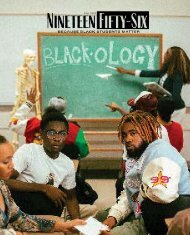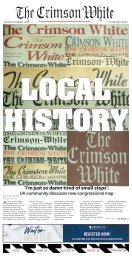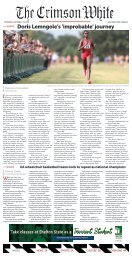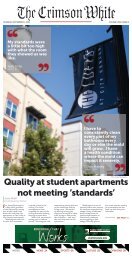Nineteen Fifty-Six Vol. 2 No. 5
This is the 2022 print edition of Nineteen Fifty-Six magazine. The theme "Movin' On Up" is inspired by the Black Panther Party.
This is the 2022 print edition of Nineteen Fifty-Six magazine. The theme "Movin' On Up" is inspired by the Black Panther Party.
You also want an ePaper? Increase the reach of your titles
YUMPU automatically turns print PDFs into web optimized ePapers that Google loves.
and Richard Delgado to explore the intersectionality<br />
of race and law in America. It was designed to examine<br />
American liberal approaches to racial justice.<br />
However, CRT rose to mainstream notoriety when<br />
American conservatives began the fight against teaching<br />
it.<br />
Schools stopped teaching certain aspects of Black history.<br />
Chapters about slavery and the civil rights movement were<br />
removed from textbooks. Conservative organizations<br />
criticized the validity of critical race theory.<br />
“When followed to its logical conclusion, CRT is<br />
destructive and rejects the fundamental ideas on which<br />
our constitutional republic is based,” the Heritage<br />
Foundation claimed.<br />
Arguably the biggest issue that has come out of banning<br />
critical race theory is knowing where the line is. That line<br />
being free speech. Where does limiting the teaching of<br />
CRT end and limiting free speech begin?<br />
Or is limiting CRT also limiting free speech?<br />
schools of thought like psychology and research in racist<br />
practices. The crusade to limit CRT has now — whether<br />
intentionally or not — become a crusade of limiting<br />
diverse academia.<br />
“Administrators, among the most risk-averse people in<br />
the known universe, will err on the side of canceling<br />
programs and courses,” Kruse said. “Only the brave and<br />
the foolish will teach ethnic studies in Ohio in the future.”<br />
Despite being almost 200 years apart, the goals of<br />
lawmakers in 1831 and 2022 remain the same: limit<br />
different views of culture and the world. When one takes<br />
a critical lens of the actions of these lawmakers, one thing<br />
becomes clear.<br />
These laws are designed to make white people feel<br />
comfortable and for Black people to have no voice.<br />
Censorship — no matter what form it takes — chooses<br />
what stories are more important. It chooses what voices<br />
matter.<br />
It chooses what race matters.<br />
Timothy Messler-Kruse is a professor of ethnic studies at<br />
Bowling Green University in Ohio. The state legislature<br />
is close to passing House Bill 327. The bill defines several<br />
ideas that shouldn’t be taught in any public school or<br />
university.<br />
Most of the concepts in the bill — like teaching that one<br />
race is superior or inferior to others — are ideas Kruse<br />
teaches against. But, as the bill reads on, the ideas become<br />
increasingly more vague.<br />
The vagueness of the bill reaches over into other<br />
59


